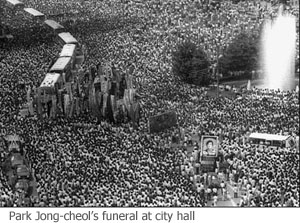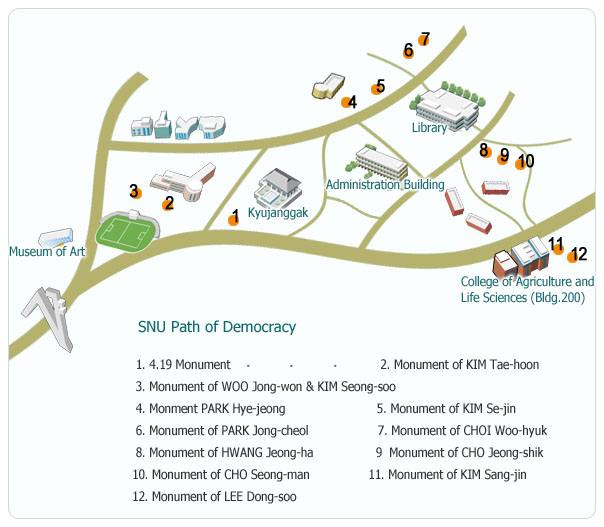 PARK Jong-cheol, a senior in SNU's Department of Linguistics, was a member of a resistance organization protesting the military dictatorship controlling South Korea in the 1980s. He was arrested by the police and brutally tortured to death when he refused to give up information regarding the location of his compatriot PARK Jong-woon. His death became a symbolic catalyst to the 1987 democratic movement, which led to the implementation of direct presidential elections and became a large step towards the democratization of South Korea. The protest proved to be the last step of Korea's walk on the path to democracy, which had begun in 1960 in opposition to the Seungman Rhee dictatorship and had restlessly barreled on until the adoption of procedural legitimacy in 1987.
PARK Jong-cheol, a senior in SNU's Department of Linguistics, was a member of a resistance organization protesting the military dictatorship controlling South Korea in the 1980s. He was arrested by the police and brutally tortured to death when he refused to give up information regarding the location of his compatriot PARK Jong-woon. His death became a symbolic catalyst to the 1987 democratic movement, which led to the implementation of direct presidential elections and became a large step towards the democratization of South Korea. The protest proved to be the last step of Korea's walk on the path to democracy, which had begun in 1960 in opposition to the Seungman Rhee dictatorship and had restlessly barreled on until the adoption of procedural legitimacy in 1987. In November, Seoul National University officially opened its 'Path of Democracy,' a 1.2-kilometer path leading from the 4.19 Monument near the Main Gate through the College of Humanities, wrapping around the Central Library to the College of Agricultural and Life Sciences that is lined with monuments to 18 former SNU students, including Jong-cheol Park, who gave their lives in the Korean democracy movement that racketed the nation in the late 20th century.

The modern history of Korea is a tumultuous vortex of bloody political movements and endless changes in authoritarian power. This history is all the more notable because Korean democracy was largely shaped by the efforts of university students who sacrificed their immediate well-being and, for some, their lives for the development of a democratic state. From the 1960 April 19th revolution to the 1987 June 10th protest, university students stood at the center of democratization. Seoul National University, as the premier institution in Korea representing the social and intellectual elite, became a beacon leading these students in their fight for political justice. During the opening ceremony for the Path of Democracy, SNU president LEE Jang Moo stated,"From 1960 to 1987, Korean society showed much dedication and sacrificed much for the cause of democracy. Seoul National University contributed its part as one of the major stages of the democratic movement. More than 4,500 students were arrested or hurt during the protests, and it is thanks to these heroic fighters that we stand where we are today."
Korea's democratization is far from complete. Although procedural justice has been achieved, the nation is still marching towards discovering the true meaning of giving power and a voice to the people. Seoul National University remains a powerful symbol of active youth working to improve the state of society, and the Path of Democracy provides an opportunity to look back on the struggles of the past and serves as an inspiration to strive for liberations of the future.
Dec. 17, 2009
Written by Pia WON, SNU English Editor (SEE)
SNU PR Office

